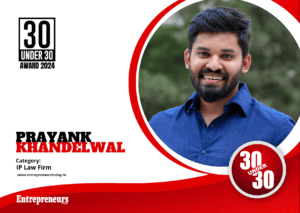
Entrepreneurs Today got in touch with Prayank Khandelwal, a former engineer turned lawyer and software engineer from COEP Technological University, to learn more about his journey of tapping into the IP market.
In 2019, at 25, Prayank co-founded Photon Legal with a senior partner from his previous organization. Specializing in Intellectual Property for SaaS startups, Photon Legal assists in securing IP, fundraising activities, and corporate legal matters. The firm’s name, inspired by the particle of light called photon, reflects their mission to bring speed and efficiency to the legal processes in India.
In the span of four and a half years, Photon Legal has served over 450 clients globally, maintaining a 100% success rate. Offering a unique money-back guarantee if a patent doesn’t get approved, Photon Legal stands out in the legal landscape.
Recognized by Forbes India as a top 10 firm and featured in leading publications like Economic Times and Silicon India, Prayank Khandelwal and Photon Legal aim to empower entrepreneurs by safeguarding their innovations and promoting fair competition. Till now, they have actively participated in various accelerators, assisting companies in obtaining potential funding and other opportunities.
An unconventional journey
Prayank’s journey from engineering to law and entrepreneurship was sparked by a unique blend of exposure and market gap. He reveals,
“My introduction to intellectual property (IP) occurred during a student exchange program in Israel, where I discovered the crucial role IP played in the success of startups—a concept relatively overlooked in India at the time.”
Returning in 2016, Prayank joined a law firm, combining his engineering background with legal expertise to comprehend the intricate IT applications requiring protection. The fusion of technology and law became apparent as he delved into AI, big data, and computing networks. Motivated by the potential to pioneer something significant, he decided to take a gamble. Within six months, he not only became a Patent Agent but also pursued law, passing the Bar Examination in 2018.
His ambition to start his own venture grew, fueled by the desire to become a better leader and register himself as a legal professional. Hailing from a Marwari family with a business-oriented background, Prayank’s aspiration to establish his own company became a reality with the founding of Photon Legal in 2019. The firm, specializing in intellectual property for SaaS startups, has since gained recognition and success under Prayank’s leadership.
The market today
The current market for intellectual property protection, as observed by Prayank Khandelwal of Photon Legal, remains largely untapped. He says,
“Many individuals and businesses still lack awareness regarding the importance of protecting intellectual property, leading to a dearth of reliable information online.”
Prayank and his team at Photon Legal are actively addressing this gap through various initiatives.
They are engaging in regular awareness sessions, conducting webinars both online and offline, and Prayank has taken a commitment to upload a video every day on his YouTube channel to share valuable insights. This concerted effort aims to educate and inform the public about the significance of intellectual property, particularly in the context of technology and startups.
Despite being in operation for four and a half years, Photon Legal notes that the market remains open with ample opportunities. The lack of competition in providing comprehensive services, including educating clients on writing quality patents, positions Photon Legal as a valuable resource in the field. The focus on creating awareness and sharing knowledge sets the stage for potential clients to recognize the need for protecting their technology and seeking assistance from experts like Photon Legal.
Challenges faced
The primary challenge faced by Photon Legal in building its business has been the lack of awareness about the importance of intellectual property (IP) protection, particularly in the Indian market. Many individuals and businesses are not fully cognizant of the benefits of safeguarding their innovations through patents and trademarks.
In India, there is a notable hesitation when it comes to allocating specific budgets for IP protection during the research and development (R&D) phase. Unlike more established markets like the US, China, and Europe, where organizations allocate funds for both research and IP protection, Indian businesses often prioritize launching their products quickly without considering IP protection as a crucial step.
Another challenge highlighted by Prayank Khandelwal is the perception that IP in India is often viewed as merely a piece of paper without substantial value. This perception is exacerbated by the slower and somewhat sluggish nature of the legal system, making litigation less attractive for those who fear a prolonged legal battle.
Despite these challenges, Photon Legal has successfully navigated the landscape by expediting the patent approval process, securing patents in as little as six months in India. The firm actively works to address awareness gaps by conducting sessions and webinars, aiming to change perceptions and educate businesses on the tangible benefits of intellectual property protection.
Who should get an IP?
Prayank Khandelwal strongly recommends businesses, regardless of their scale, to invest in intellectual property (IP). He views it as an essential investment, suggesting that even if considered a marketing expense, the benefits far outweigh the costs. Whether a small startup or a large enterprise, having IP, such as patents or trademarks, carries significant advantages.
From a marketing perspective, presenting a product or service with associated IP can enhance credibility and garner respect from investors, clients, and vendors. It establishes a company as innovation-driven and focused on protecting its creations. While there are costs associated with obtaining IP, Prayank emphasizes that these expenses are negligible compared to the brand value, goodwill, and marketing benefits accrued.
Investing in IP provides exclusivity in the market, offering a competitive edge. It not only safeguards against potential copying but also positions the company as a leader in its industry. Prayank cites examples of major global companies like Apple, Microsoft, Google, Tesla, and others, emphasizing that their success is attributed to owning and licensing intellectual property.
Ultimately, Prayank’s vision is to contribute to making India a first-world nation by fostering a culture where entrepreneurs recognize the value of protecting their intellectual property. By doing so, businesses can not only secure their innovations but also contribute to India’s growth as a technological and innovation-driven powerhouse.
Plans ahead
Looking ahead, Photon Legal has ambitious plans for expansion. This expansion is not just about gaining easier access to clients but also about establishing a global network and presence. Currently, Photon Legal already serves a diverse clientele, both international and Indian, and has partnerships with foreign councils, allowing them to navigate the complexities of intellectual property protection across 120 countries.
The shift to the US and Canada is expected to open up new opportunities and connections, especially with the concentration of tech startups and Silicon Valley’s influence. Prayank anticipates that this move will enhance their marketing efforts and broaden their reach in terms of both clients and collaborations.
Note from Prayank:
Before he signs off, Prayank highlights some of the things he incorporates in his daily life to navigate the entrepreneurial challenges. He shares,
“Before diving into entrepreneurship, I undervalued the importance of continuous learning, but now I make it a daily practice to read two to three chapters from various books, focusing on self-help, business, marketing, sales, and strategy. These books serve as invaluable teachers, helping me coach my team, gain different perspectives, and expand my vision.
Recognizing the responsibility that comes with leading a team of 20 members, each supporting multiple families, I’ve invested in business coaching to make informed decisions. Gratitude practice is now a daily routine, contributing to humility. Setting up effective systems and processes has allowed me to take breaks, even trekking Everest base camp for three days while my team efficiently handled work.”







